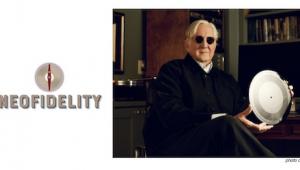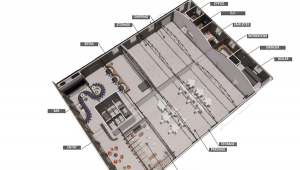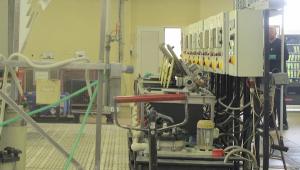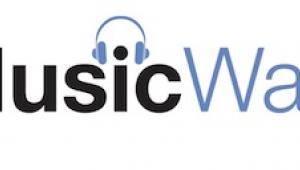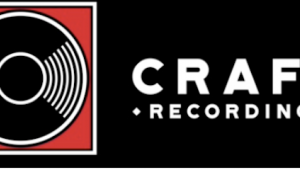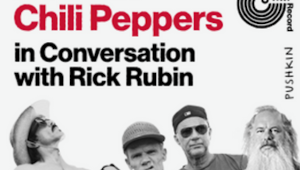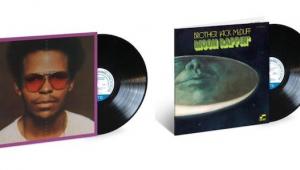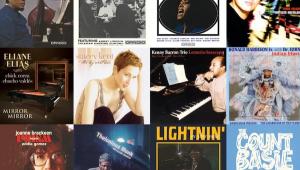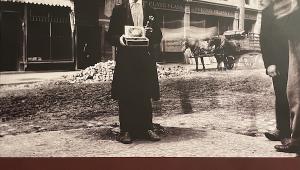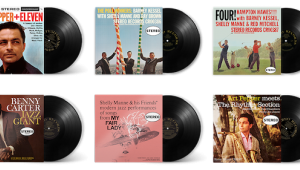...one of these analog open-reel copies and an MQA processed CD, both from the same 192/32-bit digital master tape.
Analogy Records Sells Only Master Tapes
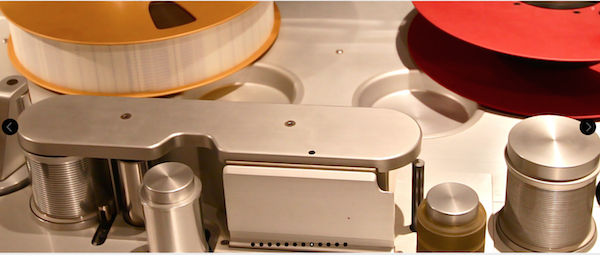
How can it do that? It records its artists to multitrack digital at 192/32 bit and then if you order a copy, it mixes down from the multitrack recording to produce an analog master tape that you get.
You can go to the website and see the artists and recordings that are for sale. With the exception of Peter Erskine, I'm not familiar with any of the artists but that wouldn't stop me from trying one of these just "because".
Most interesting is that the tapes are available in two levels: "basic" and "premium". "Basic" is available in both two or four track formats at 7.5 IPS CCIR EQ only on SM468 tape. "Premium" is "completely customizable", allowing you to choose different tape formats, speeds, emulsions and EQs. Each comes in a hand made collector's box with album booklet, unique design aluminum flange and "much more".
Cost? Basic tapes are about $100. Premium about $270.
For more about the company, the product, the artists and most importantly, the recording engineer and company director Roberto Vigo, visit the analogy records website.
Vinyl? Maybe later. For now it's all tape. BTW: if you visit the site and click on the "links" you'll see one to an Italian site named "analogplanet". They sell refurbished R2R tape machines. We don't.
- Log in or register to post comments


Well, it's a different idea. The prices on the site aren't U.S. currency. So $112 to $300-ish. Still, considering the effort put into each order, kinda "cheap". Compare that to Tape Project prices, for instance. I wouldn't wanna go to the trouble each time an order came in, automated mixing or no.

Yes. And 2 track is also referred to as half track. I sure miss my two Revox A-77 half tracks now... it's been years but I can still feel myself feeding the tape to play it. Those machines sounded amazing. How to people afford tape prices now?

... How DO people afford tape prices now? The writing was on the wall back in the mid-1990's when Global Imports on Fifth Ave in NYC had 10.5" reels of quality Maxell tape for $9.99 a reel... bought what I could but saw the writing on the wall and, sadly, moved on.

I have been playing around with this idea with a Studer C37. I use a Nagra VI and play hi-rez files of our releases using the Nagra's digital to analog converters into the C37. That tube Studer C37 is really special. The tapes sound so great. I have been using SM900 1/4 inch tape at 15ips.

Been down the Tape road, modded the deck, got the tube tape preamp and built a collection of commercial 7 1/2" tapes. Not enough to stop there, i then bought a dozen of the Tape Project albums. Sure they sound great however until someone actually releases an album that I really want, I'm done.

calling these analog tape *copies* from digital files a "master tape" is just disingenuous marketing. "Master tape" is a pretty specific term in audio and analog tape copies off of the digital files and sold to consumers is not a "master tape" by any known definition or usage of the term "master tape." Not saying this isn't a cool idea or that it is not worthwhile. But calling these "master tapes" is just marketing hype.

It meets no existing definition of a "master" tape. Master tapes come in a few different flavors. Original master tapes are either the first generation mix from multitracks (or original unprocessed recordings) used for archival purposes and for actually mastering the commercial copies of the recording. Or they are copies of that same original master used for actual mastering of records, CDs or other commercial media. The tapes that this company is offering are not archival nor are they used in producing commercial copies for sale. They are themselves commercial copies offered for sale. On top of that they can even be customized which makes them anything but archival originals or production master tapes. It's a complete misuse of a term with established meaning in audio. A marketing gimmick and a misrepresentation of what they actually are.

you wrote: "Original master tapes are either the first generation mix from multitracks (or original unprocessed recordings) used for archival purposes and for actually mastering the commercial copies of the recording."
That's exactly what we're doing, printing from the studio's multitrack system via analog mixing (or summing if you prefer the term) to 1/4" tape. Sincerely I don't know any other term to define a mix that jumps out from the mixer main out hitting the tape...

No it is not what you are doing.You are not selling "master tapes." The tapes you are selling are analog tape **copies** that are produced from digital files for the sole purpose of being sold as a commercial product. True master tapes are actual original tapes specifically made for the purpose of archiving an original recording and/or mastering records, CDs or other media for commercial sale. What you are doing is the equivalent of calling a production model car a prototype car. A car company can make a production model *exactly* like it's original prototype but those production models would not be a prototype car and to call them that would be a gross misuse of the term and misleading advertising. These terms have established, understood meanings. And by those meanings you are not selling "master tapes." The tapes you are selling are neither original recordings nor production masters used to master records, CDs or anything else. They do not meet any normal usage definition of master tape.

To clarify, in the music industry, a "Master" is the final product that comes out from the recording system (whatever it is), recorded to a media (tape, DAT, lathe, file etc.). This "Master" is then used to create copies of different media.
Yes you're right, no label and/or recording studio will sell Masters because they are used for archiving or duplicating, so no one ever thought about it.
Each time an order is placed on Analogy Records website, we book at least 3 hours in our recording studio to setup everything, perform a mixdown from our multitrack system and through our analog summing mixer, we hit the tape.
As long as I know, no one did this before, if I'm wrong I apologize.
If you prefer, we can call our product like this: "Master that for a mere coincidence is recorded on tape" :)
Thank you so much for keeping this conversation alive and interesting!

What you re doing is unique and no one to my knowledge has ever done it before. But you are not selling "master tapes." If we are willing to change and bend the common established meaning of these terms we lose the ability to communicate with any real understanding. If you are really interested in what I prefer. I prefer you leave the word "master" out of it. You could call them what they are. First generation analog tapes copied from hi res digital files. You can even come up with a new term and trade mark it since you are indeed offering a new product that is somewhat different than anything before it. But you are not selling master tapes. IMO you shouldn't call them that.

Thank you so much for your view!

This company gets called out for what they are and they leave a condescending comment like this, clearly this is another snake oil audiophile sham right up there with "better records" and "DXD" releases made from 24/96 files, in fact its exactly like those DXD releases, all you are selling is a container for digital files that will sound better or worse only depending on your DAC or reel setup and not because the tapes are in any way special, shame on you!

I don't believe that an aggressive behavior could lead to something useful, I have already explained the production methods we use to create our products, so I don't get the sense of your reply...
Have a good day!

It seems perfectly clear to me that you are producing mix-down master tapes from hi-rez digital files - on demand - to whoever wants to pay for it and that´s perfectly legit to me, as long as the buyer can understand that from the contents of your website.
I see no information about the recording and would like to have that available. Other than that, I think that you have put up a great company with a great product. There´s no point in getting into an analog x digital flame here and I´m really curious to listen to all that Erskine!

thank you for the feedback, it seems that I should write a technical post about the production process of our albums, (I'm writing on purpose "production" instead of "recording" because a production involves more complicate mechanisms...), an article that will describe the modern production techniques, the integration and synergy of analog and digital...
Indeed, talking about mixdown from digital files, is very restrictive, most of the magic is due to the analog summing (depth, soundstage, separation and ensmeble), so it should be interesting to explain what happens and why.
Peter Erskine's album is a masterpiece of great jazz music, he's immense as well as Rita Marcotulli and Palle Danielsson. Great musicians and great human beings, that's why it's a great album!

Sorry but it's a master tape. Multi track mix down to two channel stereo produces a MASTER. Master TAPE, master DAT, master WAV, master CD, master cassette, master 8 track, master elcassette. It's a master in a professional recording studio and it's a master in a garage studio.
I prefer not to be a master debater so I'll leave it at that!

Direct 15 i.p.s. 1/4" analog dubs from the original cutting masters.
That would be something that would get me excited!
Custom request? "Not too much Pultec. My speakers can't handle it".

I've been a recording engineer for 30 years with 2" analog, Sony/Mitsubishi/Studer, MCI analog and digital pro experience and about every other format analog and digital that you could experience as an an engineer. This has to be one of the most ridiculous offerings to try to capitalize on
on the analog craze I've seen yet. From a tech standpoint it is complete marketing nonsense and is a complete ripoff to the consumers pocketbook.

it does give us subjectively better sound. But if that is of no importance you would have a point....I guess.

they just want to make money the easy way. Let them sell their digital files for $9,99. A good analog tape is a piece of art and craftsmanship. 192/32 means not only that the music is digital, but also that a lot of mathematics and electronics between microphone and the hard drive had been used. Pure analog recording needs only some basic resistors, tubes, caps and wire windings in the recording chain. Digital recording needs thousands of electronic circuits in micro chips in the recording chain (clocks, main boards, main processor, AD-Converter etc.).

Hello PeterPani, thanks for your comment.
There are many other companies that are doing tapes, some of them are real "labels", means they do contracts with Artists and producing original music, others are not labels and they duplicate existing "masters" and selling copies. Almost everyone is doing just fine... Then, there are a lot of offers on the internet of REAL master tapes, maybe found in a garbage bin on the backyards of a recording studio (but that suppose that you still believe in Santa Claus...). :)
For what I know today, Analogy Records is the only label that can produce master tapes directly from the multitrack system, and yes, we record with digital multitrack to ensure the constant quality in the time, mixdown after mixdown, year after year, no tape wearing problems.
If you are a 100% analog chain guy, that's perfectly fine there're a lot of choices out there, just pick up the one that you like more, and you'll be happy. Everyone's ideas must be always respected...
Just a curiosity, what tape deck do you own?
Peace,

"Analogy Records" sounds a bit wrong to me... I use a Revox A700 (because it can play 3,75-7,5-15ips) equipped with one 2-track, one twin-track and one 4-track head. The heads are connected to a custom made tubed deHavilland preamp with all the different EQ-curves for NAB and IEC curves for different tape speeds and different settings for all the modifications of the curves since the beginning of tape. Best tapes I own are the ones from mid 1950's. No degradation in sound compared to the tapes of the +1980's. Thanks for asking!

But the reason you're getting so much heat over this is because you're essentially discounting the importance of the A/D and D/A conversions, which most of us (from experience) realize typically harm the music.
It's frustrating as an enthusiast because on the one hand, the effort is done due to the belief digital isn't as transparent as it needs to be "except when someone else decides it is." It's the same slippery slope we've been battling ever since Perfect Sound Forever was declared.
Most of us probably have a soft spot for tape. I know I do. But they suffer from a different set of practical limitations compared to LP, namely duplication as you're aware. More cash can overcome this to an extent with making more than one master mix down at a time and then creating customer copies from those. Does an extra tape generational loss sound better than only one that went through a digital step instead? Dunno, have you tried it? Sent both kinds of tapes out to "beta testers?"
Overall you'd be running both masters and possibly the session tapes more often (to replace worn masters?) but then again, how many of these tapes will be sold? Even Tape Project only sells a limited number of tapes, due to contractual reasons.

Thanks for your comment, please explain your point of view...

Sorry guys, it was referred to soundman45's comment...

Absolutely agree. There's no way to take a HDA digital master, put a DAC's output on analog tape and come out with something more accurate sounding to the original master than just running the DAC's output straight into an amp and speakers.
Not a subjective improvement but an imaginary improvement.

They should at least have the decency to CLEARLY SPECIFY that their tapes are Master digital tape and NOT analog master tapes.

they even dare to call themselves Analogy Records.

I will forward your complain to the marketing guy... :)

Hello audiosword, thanks for your comment.
In our company's logo there's written "Studio Original Master Tape" and I believe it's pretty much precise... :)

the words "Studio Original Master Tape" are always used to refer to analog tape, hence the word TAPE, what you are selling is nothing of the sort, if you were in an industry with any sort of serious regulation you would be sued for libel and to be quite frank I wish the RIAA would get up off their sorry asses and do such things to protect what good reissues from REAL studio original master tapes we have left

I don't know your heritage nor your knowledge about the recording industry, or how many records you have engineered or produced, BUT, to be 110% clear on this matter, I've asked the question to my friend, teacher and mentor Al Schmitt.
I wrote him the same definition I used in this forum asking if something was wrong, and this was his answer:
"I agree with you, but there could be two master tapes, a master multiple that the original track was recorded on, and the final two track mixdown tape that goes to mastering. I hope this helps. Al."
Now, if there is someone else in this forum that has +60 years of expertise, has won 24 Grammys, has a star in the Walk of Fame in Hollywood, and is one the most respected guys in the music industry, I will carefully listen and learn from his words.
I already knew it, but yes, I'm producing Master Tapes, now you know it as well :)
Peace, R_

"I wrote him the same definition I used in this forum", that definition itself is incorrect, using the same snake oil rhetoric on industry professionals does not amuse me, good day sir

Sorry Michael I should have clarified. It has been my experience as an engineer and it just could be my ears, that when you record something digital even at 32 bit 192 it imprints it's kind of sound that transferring back to analog doesn't take away. I just think it would make more sense to stay Analog all the way. I've done my fair share of mixing Digital to analog 1/2" half track and eventually came to the conclusion that if you're going to end up with an analog master and you're looking for that analog warmth, don't introduce digital into the mix, again it just may be my ears.

In my experience too (in both doing it and buying commercial products), digital - despite the mathematical theories some like to throw about that suggest it is literally sonically "perfect" - does as you suggest add its own layer of colouration, character and degradation. I am not sure that I entirely agree that in doing so you will lose that "analogue warmth". The dCS converters for example, have always retained that "warmth". I think what is critical though is that as soon as you get up there in terms of resolution (by that I mean both bit depth and sampling rate), extreme care needs to be taken and the system needs to have extremely precise and capable clock control. Without these things the digital "layer" in the process makes itself painfully obvious to the point of destroying the recording. I have seen this happen so many times with modern labels who - despite offering 24/96 and 24/192 products - fail dismally to capture the reality like a good Studer would, for example.
But then again, done right and there really is nothing to fear - whether that means using a digital master, using digital between analogue stages or even digital all the way. Take the latest Berlin Philharmonic recordings on their website, for example. They sell a vinyl version of the 24/192 recording of the Schumann Symphony cycle. The sound is incredible. These are amongst the very best recordings I own. All that "analogue warmth" is there (which to be honest in my book is simply what I hear at a live concert anyway) in those original digital masters. Not just the vinyl.
There is a lot to be said for digital done well but it has to be done well to an obsessive degree and with top calibre equipment. Done right (it rarely is) in my book it conveys advantages not available in the analogue domain(i.e no degradation, consistent playback, extreme levels of editing capability, etc).
I actually applaud what this Analogy Records company is doing and the digital bit wouldn't put me off in the slightest (quite the opposite - it would encourage me). There would be far greater sonic variations in side A versus side B of a typical vinyl record pressing than there would be sonic variations introduced by a state of the art digital process, provided it is done correctly with exceptionally capable (and extremely expensive) equipment. The Berlin Philharmonic have proven that it is possible and I am sure these guys would be just as obsessive.
The $100 "base cost" for a 2-track 7.5 ips to me seems a bargain to be honest. That is about 40% more than a typical audiophile 2-disk classical pressing and quite palatable in light of the advantages of open reel over vinyl.
Perhaps if we were living in an era where open reel recorders were ubiquitous and "affordable" and the repertoire were my cup of tea, I'd certainly be in on it.

I have come to realize that the key to making really good digital recordings is the converters and the steps you take to make a final master. As people have pointed out even at the final master stage, even a slight fader change going though a really cheap console can change sound at the end. Even some of the best converters out there have clocking errors, but in the digital world every manufacturer deals with it's limitations in a different way. It's just a design/cost issue. My experience is, go with the recordings you love and find pleasing in the vinyl world, don't get too caught up on the technology.

You guys are quibbling over nothing... he sells 2 track tapes, which come off of the mixing console. It's obvious what he sells, it's pointless to debate whether his use of the term "master tape" is right or wrong...
A better question would be - after we receive this 2 track tape, should we then hire a mastering engineer, like Bob Ludwig, or Kevin Gray, or Steve Hoffman, to master it? That is the way things are typically done. :-)
But I suppose Mr. Vigo at Analogy might say, he's applied the PERFECT EQ to the 2-track mixdown, and no further "mastering" is necessary? Correct me if I'm wrong. ;)
Another interesting thing worth pointing out - I just looked over the Analogy records website. Nowhere, and I mean nowhere on the site is the word "digital" ever mentioned. Why keep it a secret that your record to multi-track digital? Are you purposely hiding that fact, or maybe it's just an honest oversight?
And then in the gallery section, there's even a close up picture of a 2-inch tape machine, a Studer A-800 I believe, with the caption "Goin' into 2"". Except that you don't record to 2-inch analog, you record to 32/192 digital, as we've been told.
http://www.analogyrecords.org/wp-content/uploads/2015/04/4.jpg

you MUST hire a mastering engineer is your goal is to produce CD, vinyl or any other media from that master tape, but obviously this is strictly forbidden by the exclusive licence that comes with.
Then yes, it's a plug-and-play product, no tweaking of any kind needed... ;)
Digital: no secret at all, I'm quite serene saying that the process involves a digital hi-res multitrack system (as here in public posts). Every "big guy" in the industry is working like me, hybrid, like a Toyota Prius, getting the best from both analog and digital domains. As I wrote in another reply above, seems there is the need of knowledge about the production process of a modern album, I will write an article on that, maybe worth to a dedicate section in the Analogy Records website, so everyone will be informed on the process.
What I would not say, neither under torture, are my mixing techniques. You may ask a chef the ingredients of a dish, not the recipe!
About the pic you've mentioned, one of the techniques that a mad recording scientist (aka the Producer, aka myself) can try, is to hit the multitrack tape during recording to get that subtle (+/-) compression that could help some instruments in some songs, and then back to the DAW. We did it and then, compared to the same digital version, decided not to use it. :)
The fun part of my job is to experiment, whenever you can, having an idea, try different stuff in order to get THAT sound that you have in mind. Sometimes it works, sometimes not!
R_

Michael a while back you wrote that a company was going to build new reel to reels. What ever happened? Have not heard anything else about it. It would be nice if a company would start making reel to reels again.
http://www.analogplanet.com/content/famous-swiss-tape-recorder-brand-re-...

They announced that a prototype of the new machine will be displayed during next Munich High-End Show. I really hope they will succeed!!!

It would be nice to see a new unit come to market. I currently have a Pioneer RT-909 that needs to be recapped. Would love to have a new machine but for myself it is not a must have. If they are at a price point that I can afford then I am in. If not I understand also. Are these going to be more on the commercial side or more on the consumer side?
Would love to see Pioneer or someone like that make a consumer machine at the 2000 or lower price point. Seems like they could put out a decent machine at that price point. Its kind of one of those niche things I guess. No profit in it for them.
Anyway Thanks
Would love to see Pioneer or someone like that make a consumer machine at the 2000 or lower price point. Seems like they could put out a decent machine at that price point. Its kind of one of those niche things I guess. No profit in it for them.
Anyway Thanks

This is a scam! They call themselves Analog(y) Records, yet they digitize all recordings and then up-charge substantially for the R2R version? BS! Thank you for Michael (once again, and oh so many times before) for uncovering the BS.
I suspect there would be little to no difference if users simply downloaded the 32/192 version and recorded it to their own R2R's. Oh, and I have a Studer, among other R2R's, so don't give me any flap that your gear is better.
Here's the poop: don't let anything digital touch your master tapes. Don't even allow it in the same room. OK, you can allow it in the same room, but you get my point. Keep digital far far far away! Get two Studer's (or more) pumping out tape to tape copies. THEN, and only then, you can charge the premium. Follow the lead of The Tape Project - they are the gold standard IMHO.
Master Tape to digital back to tape - BLASPHEMY!
Analog(y) Records - be true to your name!

The process it flawed. It unfortunately buys you no increased fidelity in the end.

IMO of how he states his process of creating tapes from a digital recording. Analogy is taking a high resolution digital recording and creating a 1/4" master tape....Boom!
I have a Teac X2000R and would love to buy some of these tapes but as you know my deck only plays up to 7.5ips. Tape Project and a couple others I have inquired only do 15ips and on special request do 7.5ips.
My big issue in these offerings is that it is not the genre of music I listen to to spend upwards of $300 for one tape. I also think the sales volumes would go up if for example someone would issue Dark Side Of the Moon on 7.5ips tape from a very high quality digital file..but there in lines a big problem for some of us, is there such a thing when the original recording in '73 was analog to tape...Maybe MoFi would sell there "master" copy of this recording to these tape guys.
There are other albums I would love to think about buying but specifically in the progressive rock genre....I can only drool at the thought of spinning on my Teac a master tape of say Rush 2112, Genesis The Lamb, Can Ege Bamyasi, King Crimson Larks Tongues or something very recent like Steven Wilson The Raven That Refused To Sing......
I suppose a question I would have is how much better would these tapes be compared to me dubbing a 24/96 hi-rez file to tape....worth the $100-$300 price tag??

Let's invite Dr. Mark Waldrep into this conversation and gauge his impressions. He would smell the snake oil sizzling in this pan in a second. I should do just that.

Save your effort. Waldrep will tell you that no matter how many bits or cycles per second are employed if he doesn't hear (?) significant energy well past 20 KHz it isn't actually hi-rez. Personally I am more concerned with 'resolution' in the part of the spectrum I can hear but Dr. Mark has a different and immutable criteria.

Hello,
vith the analog "fad" going on, everything must be analog to sound good, even if it's digital.
Taking an digital recording and putting it on an analog medium is getting the worst of the two worlds: those who don't like digital will have it with the added bonus of the drawbacks of tape.
The same with many vinyls made from a digital master, you make a CD that wears out. A while ago i contacted a vinyl pressing unit out of curiosity, they advertise: send us your master, on analog tape or CD-R or MP3 via the internet......
Jean

I haven't visited Analog Planet much lately...been very busy finishing my Music and Audio book...but I got an email recently about this thread. I would agree that Analogy is not selling copies of "Master Tapes"...the masters, in this case, are high-resolution digital PCM files at 192 kHz/32-bits.
I actually considered doing this some years ago with my AIX recordings. I thought about offering first generation 2-track 15 ips transfers of my high-resolution catalog for analog tape advocates. When I first proposed the idea, David Pogue at the Yahoo reel to reel group thought it would be interesting...until he realized the original source would be digital and somehow the "digititis" would pollute the analog copy (I've done some copies from 96 kHz/24-bits to my Nagra IV-S and they sound amazing. I've shared them with reel to reel guys and they couldn't tell the difference). But the aversion continues.
What Analogy is really selling should be called "High-Res Transfers". The name of the company, their spiel, and the concept seems deliberately confusing...kind of like HD Radio. The prices are not crazy, though.

While I think Analogy is mislabelling their product as "master" tapes. I don't think they are misleading anyone about what the product actually is in their product description.

So a MULTITRACK mix down to two track is not a master?
I also agree that they not selling copies of masters, they are selling masters. TWO CHANNEL MIX DOWN FROM MULTITRACK.. MASTER!
"That's exactly what we're doing, printing from the studio's multitrack system via analog mixing (or summing if you prefer the term) to 1/4" tape. Sincerely I don't know any other term to define a mix that jumps out from the mixer main out hitting the tape..."
I think everyone is so eager to bash digital (along with their ignorance of the recording, mixing, and mastering process) that they are not seeing the forest for the trees.
If this company was using an analog multitrack as a source would it then be a master? Yep. The same as if they are using a Digidesign multitrack as the source.
Always good to see uninformed trolls bashing a company trying to offer a service that no one has before.
http://www.analogyrecords.org/about-us/
Yea, looks like a pretty shady setup to me! A CD player and a reel to reel? I don't think so....

Depends on whether or not it is used as a master. Heck a lot of mastertapes are not mixdowns from multitracks. A lot of recordings are not done multi track. They still have masters though.

I recall when digital, in the form of CD's, arrived there was often -- if not required -- a three letter code helping to establish the recording chain. For example, AAD would designate Analog/tracking, Analog/mixing, and Digital/mastering.
It occurs to me what we have here is DAA. I was very excited. Please note tense.

I get that the real time mixdown from digital multitrack is captured to analog tape. This basically is just using the tape as an effect which is not uncommon in the studio. The Digital to Analog converter used becomes very much an issue and has to be compared to the DAC used in the personal listening environment. The tape electronics, cables, and connectors also are in play not to mention the local power situation, tape formula, and equalization curve.
I'd be much more interested in a fully digital in the box mix so that my own DAC etc creates the "first generation analog" signal. My experience with analog tape recording versus DSD from the same microphone feed was no contest. The coloration of tape was considerable and print thru, head bass bump, S/N, and scrape distortion was unacceptable. The DSD is hair-raising in comparison.
Dreaming of course as their business is obviously selling reels and tape decks and more power to those who can afford this form of reproduction.
My opinion is firm, if digitally sourced keep it that way. Real analog sourced from tape is best kept in the analog domain and tape would in theory exceed the fidelity of vinyl. I will admit that I have some vinyl rips that sound fantastic. On the very few I was able to obtain high res or dsd files, the vinyl rips were retired (unless there was some real mojo in the vinyl mastering which is rare but happens but the digital mastering may differ and be inferior on occasion).
I have no plans to relinquish my Studer Revox B791 and a couple thousand Lps but presently I have over 50,000 files on my music server which does not require me to leave my seat even for a moment and my cat likes that too.
Hey what if I mixed my digital recordings to Elcaset tape? Any takers?

that anything digital is best kept all digital and anything analog is best kept all analog. I don't buy it. I have LPs sourced from digital recordings that clearly sound better than their all digital CD versions. I have LPs sourced from analog tape that were digitized that sound better than any all analog versions I have ever heard of those titles. Digital done with accuracy in mind is simply more accurate than any analog alternative. Likewise analog tape and vinyl offer unique euphonic colorations that often serve as an aesthetic improvement over absolute accuracy to the source. Why we need to drive a proverbial crobar between them seems arbitrary at best but mostly based on myths and misconceptions about analog and digital in general. I am much more interested in excellent aesthetics than ideologies. Especially ideologies that are built on myths and half truths.

Scott, I fail to see why the fact that a digital to analog conversion or analog to digital conversion degrades the signal is considered to be a myth to you. It is a fact that any such conversions degrade the electrical signal. I also went as far to say that every cable, every termination, every electrical system will also cause some noise or loss not to mention the active electronics. If you read Stereophile and look at the outputs from DACs Mr. Atkinson so sagely presents you will see gross distortion which would seem to tilt things towards analog as the purer form. It is just far more expensive and difficult to do now. I admit that digitally sourced Lps can sound fantastic and can sound superior to digital source files in some cases; Euphony as you suggest and different mastering in some cases as I suggest. I don't see any crowbar and that most all modern recordings are done in the digital domain is not in question. I do single point stereo recordings of chamber music professionally and I have compared the results of both. To my ears high resolution digital trumps analog and any conversions damage fidelity, even DSD to PCM. While I do only have a consumer Tascam X10 reel to reel may be my issue, there are far better tape machines but I do use the EE tapes and the preamps have been tweaked and output stage bypassed. However you must trust your own ears and your tastes are no less valid than my own but I speak as an audio engineer and hifi reviewer. Every stage from microphone to speaker cone loses some fidelity and adds noise. I am only stating my observation that the less stages and conversions from the origin the better. YMMV. Music is the Best!

Transparent analog to digital conversion is a reality. If you don't agree we could set up a controlled test and make a bet. (I know it's the same old same old but I do think bias controlled comparisons are better than non bias controlled comparisons for getting at what one is actually hearing and not what one is seeing and hearing) Also euphonic distortions of analog tape and vinyl are a reality. Quality in audio is subjective. If one can not hear a difference under bias controlled conditions it's pretty hard to argue degradation. If analog and/or vinyl distortions sound better than the source to any given listener that perception is subjective and inarguable. And last time I checked "better" was not considered degradation. The "crowbar" I am referring to is the common belief that one should either keep a chain all digital or all analog. It may not be *your* belief but it is a common belief and you can see it in this thread. I say nonsense to that and say that one should do what works best in the end. If in the case of Analogy recordings a mixdown to analog tape adds a nice layer of euphony then it is not wrong to go that route. A number of people have criticized their products for not being all analog or not being all digital and I strongly suspect none of those critics have based these criticisms on actually listening to their recordings. I have not heard their recordings either but I am sure not going to form an opinion as to the merits of their methodology without at least listening first. Even then it would only be valid if we could do side by side comparisons with all analog and all digital versions of the same multi track mixdowns.

The analogue sound and fertilization takes place when you record directly to tape. Just to confirm what I already knew I made a new 192khz recording and then transferred the 2 track final stereo master to a tube preamped Studer C37 in mint condition, and it did no favor to the digital recording, it just added a veil over it. You have to record directly to tape first, and then bounce back to the computer (if you need to edit digitally and by that departing from a 100% analogue signal chain) you then make vinyls or tapes directly from that digital source (since you already gone digital) hence vinyls being made from digital masters -or in this case tapes(!). These tapes from Analogy Records is clearly deceptive in my opinion. Ps: Regarding the Studer C37: when being used as a master machine from an 100% multitrack analogue session, or when recorded directly live to is pure analogue heaven, stereo or mono.





